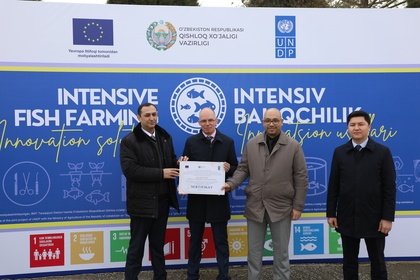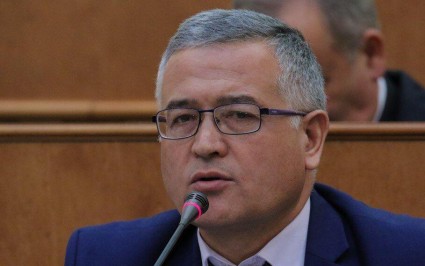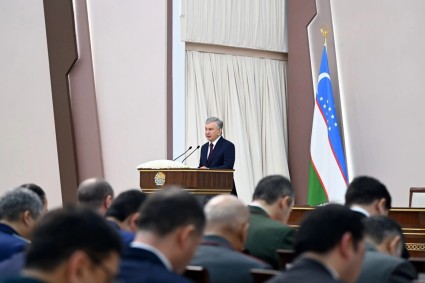Today, the Delegation of the European Union (EU) to Uzbekistan and the UNDP held the handover ceremony of equipment to the Research Institute of Fisheries to support more sustainable fish farming practices. The provided equipment will help to reduce water consumption, improve water quality and energy efficiency in the fish farms, and, in turn, support the welfare of fish.
During the ceremony, the first deputy khokim of Tashkent region on agriculture and water management issues, Botir Alimbekov, gave a welcome address and emphasized that the fishing industry is an important sector of food production in Uzbekistan, ensuring food security by supplying the country’s population with high-quality protein with excellent nutrition value. He also stressed that aquaculture contributes to the creation of new jobs in rural areas, thereby improving the well-being of people.
Mr. Wim Riepma, Head of Cooperation of the EU Delegation to Uzbekistan, highlighted that the purification and disinfection filters provided will improve the water quality, and by that, the health of the fish. Healthy fish, means healthy food and healthy people. The filters also contribute to a better environment, as less pollutants will be emitted by the fish farm. In addition, use of solar water heaters that will significantly improve fish growth in early phases, while saving electricity consumption in a sustainable way. These relatively simple techniques can be rolled out across the sector and together have a real impact on the sustainability of the fish farming sector.
Mr. Anas Qarman, UNDP Resident Representative a.i. in Uzbekistan highlighted the nation's significantly low fish consumption rate at 3.5-4 kg per person annually, far below the WHO's recommended 16 kg and the national standard of 12 kg. This is attributed to outdated, extensive fish farming technologies limiting production. To address this, Uzbekistan adopted a Presidential Resolution on January 13, 2022, aiming to booster the fishing industry through efficient land and water use and the adoption of intensive farming techniques.
The EU-AGRIN project, financed by the EU and implemented by the UNDP, supports these efforts, including an Innovation Group on aquaculture that will introduce and test abovementioned novelties as recycling of water, solar heating and other modern fish production solutions. This group, led by the Research Institute of Fisheries, focuses on sustainability of fish production, enabling more intensive fish farming. Additionally, the Group will introduce system of increase of the oxygen content, further supporting fish health and growth. The equipment generously provided by the EU will enhance research and educational efforts, particularly through the Research Institute of Fisheries and the Besharik’s vocational school in the Fergana region, aiming to upscale the project's results.
UNDP and the European Union will continue providing necessary support to the Government of Uzbekistan in their efforts towards green and just transition via women empowerment and innovation in agriculture.















